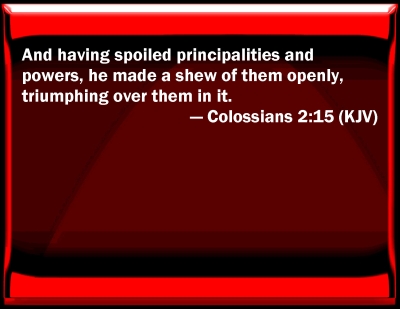In This Edition:
Faith or “It”?
The Sins That Are Past
Demon Possession
Wherefore and Therefore
Doubting Thomas
Origin and Object of God’s Chastisement
Simple As Can Be
The Day Of Itching Ears
“We need spiritual trifocals these days. There is a three-way look which our Lord set forth in His discourse about the end of the age (Luke 21:25-36). The outlook is bad, with distress of nations, perplexity, men’s hearts failing them for fear. The uplook is good, for our Lord is coming back. When we see the signs we are to look up and lift up our heads, not drop them in despair nor shake them in doleful lament. In the light of all this we need to have an inlook, to take heed unto ourselves, to watch and pray, to take spiritual stock and inventory. You are in plenty of trouble unless you are fitted with these trifocals!”
~Vance Havner
Faith or “It”?
By Vance Havner
According to your faith be it unto you.
Matthew 9:29.
“According to your faith be it…” Be what? How much does “it” include? Here is one of the smallest and one of the biggest words—small in the dictionary but large in our text! For “it” includes all our need which God will supply according to His riches in glory by Christ Jesus. And the measure of that supply is “according to your faith.” You may have all you need and all that faith will take. Whether that need be trivial or tremendous makes no difference to God—everything is His, anyway. You need not mind bringing to Him the simplest matter. The sparrow’s fall does not escape His notice. Nor will you strain the heavenly resources with a stupendous request. The ocean will hold up a boat or a battleship, and God’s grace will stand any weight you put on it.
So, whatever “it” may be that you are facing, no matter how hard or hopeless “it” may seem, do not let “it” dominate your faith, make “it” submit to your faith. “According to your faith be it” is God’s yardstick, not “According to it be your faith.”
Are you living by the tyranny of “it” or by the Triumph of Faith?
The Sins That Are Past
by Pastor Cornelius R. Stam
In Chapter 3 of the Apostle Paul’s letter to the Romans he declares that God has set forth Christ as a satisfaction for man’s sin and that redemption is obtained by faith in “His blood,” or His payment for sin at Calvary, entirely apart from works, religious or otherwise (Romans 3:21-26).
But in this same passage he states that this “remission” concerns the “sins that are past” (Verse 25). What does he mean by this? Some have taught from this verse that when a sinner turns to God for salvation all his sins are forgiven up to that time and now that he is saved he is henceforth responsible for himself. But this would mean that God saves men by His grace only to turn them over again to their own weak and sinful natures. If this were the case, the converted sinner would be lost again the same day, for what Christian believer is wholly free from sin?
Paul rather looks back here at past ages and declares that we now know and proclaim that men like Abel, Noah and Abraham, and also like Moses, David and Daniel (who lived under the Law) were actually saved by the redemption wrought by Christ, although Christ’s death was still future in their day. In other words, Christ died, not only for the sins which we have committed, but also for the “sins which are past.” The believers of past ages simply believed what God told them then, and God counted them righteous (Genesis 15:6) on the basis of Christ’s coming payment for sin.
We have the same truth set forth in Hebrews 9:15, where we are told that Christ’s death availed also “for the redemption of the transgressions that were under the first covenant,” i.e., the Law.
How blessed we are to live at a time when God’s plan of salvation has been fully revealed, and that we can now look to the Lord Jesus Christ and exclaim with Paul:
“He loved me, and gave Himself for me!” (Galatians 2:20).
“Joshua and the elders of Israel lay on their faces and prayed after the defeat at Ai, but it did no good. There was sin in the camp and Achan had to be dealt with. The church at Corinth prided itself in its tolerance of immorality, but Paul demanded that the offender be put out and delivered to Satan. There is sin in the churches today and neither pious prayer meetings nor amiable tolerance will take care of the situation. We are afraid to touch Achan and the fornicators with a forty-foot pole. There is no church discipline now, for who would discipline whom? Ananias and Sapphira are more likely to be on the official board.”
~Vance Havner
Demon Possession
by Pastor Cornelius R. Stam
The modern revival of E.S.P., fortune telling, astrology, magic, the Ouija board, the spirit seance and a score of other occult practices have caused many to wonder whether human beings may be possessed or controlled by evil spirits.
Many Christian people recall the cases of demon possession recorded in the Bible in connection with our Lord’s earthly ministry.
There is indeed much evidence that there was a great outbreak of demon activity when Christ was on earth. This outbreak seems to have abated soon after the Lord’s ascension to heaven, but many are asking: Has another such epidemic broken out?
Whatever the answer to this question, the Scriptures clearly indicate that the best defense against the activity of Satan and his hosts is sincere faith in Christ, of whom we read that, “having vanquished” the powers of evil at Calvary, “He made a show of them openly, triumphing over them in it” (Colossians 2:15). It is on the basis of Christ’s finished work of redemption that the Apostle Paul joins believers in…
“Giving thanks unto the Father, who hath made us meet [fit] to be partakers of the inheritance of the saints in light: who hath delivered us from the power of darkness, and hath translated us into the kingdom of His dear Son” (Colossians 1:12,13).
Not only is the true believer in Christ “delivered… from the power of darkness,” but upon believing he becomes “the temple of the Holy Spirit,” a living shrine where Christ is worshipped. Thus the Apostle Paul says again: “What! Know ye not that your body is the temple of the Holy Spirit” (I Corinthians 6:19). How then could the Christian’s body also be the dwelling place of an evil spirit?
Wherefore and Therefore
By Vance Havner
Wherefore Jesus…suffered without the gate. Let us go forth therefore unto him without the camp.
Hebrews 13:12,13
Jesus kept his “wherefore” and I must keep my “therefore.” He went without the gate to suffer and I must go outside the camp to serve. I am not merely to go from something, I am to go to Him. Where He is I belong. And it is not His popularity but His reproach that I must bear. The world and some churches have devised a popular Christ, but He is not this Christ of the Wherefore. One can stay inside the camp and follow this fictitious Jesus, but not the One who suffered that I might be sanctified with His blood. This present age, like all ages past, despises a bleeding Christ and a gory cross. There is nothing elegant about following a crucified Saviour and seeking a city to come.
I cannot get by with singing about the wondrous cross. Love so amazing, so divine, demands my soul, my life, my all. His “wherefore” demands my “therefore.” And that means the sacrifice of person: “Let us…(v.13), of praise (v.15), of possessions (v.16)
“Jesus paid it all” in the Wherefore. “All to Him I owe” in the Therefore.
Doubting Thomas
by Pastor Cornelius R. Stam
Don’t believe your doubts. Believe God’s Word.
Said our Lord: “Whither I go ye know, and the way ye know” (John 14:4).
Said Thomas: “We know NOT whither Thou goest, and how can we know the way?” (Verse 5).
Who was right? Of course our Lord was right. He knows us better than we know ourselves. But Thomas, believing his doubts rather than his Lord, found himself not merely questioning, but contradicting Christ Himself.
The trouble was that Thomas was thinking on a lower level than was our Lord. Thomas was thinking only in terms of locality and method, while our Lord had persons in mind. All through these pre-crucifixion chapters of John, our Lord appears to be occupied with thoughts about His Father, He had not been talking about going to heaven, but of going to the Father (13;1; 14:12). Nor had He referred to moral conduct or theological dogma when He said, “the way ye know”. Rather He had referred to Himself, who alone could gain for Thomas an entrance to the Father. “No man cometh unto the Father,” He said, “but by Me” (14:6).
So our Lord was right. Thomas did know whither Christ was going: “to the Father.” And he did know Christ, the way. Had Thomas, rather than our Lord, been right, Thomas would have been a lost soul but, only a few hours later, in our Lord’s hallowed prayer to His Father, He was to say: “This is life eternal, that they might know Thee, the only true God, and Jesus Christ, whom Thou has sent” (John 17:3).
We must be careful about criticizing Thomas too severely, for while he was apt to look on the dark side of things he was also ready to give his life for his Lord. Of all the apostles, it was he alone who said, when the Lord proposed to go to Judaea shortly before His crucifixion, “Let us also go, that we may die with Him” (John 11:16).
At our Lord’s resurrection, however, we again find Thomas believing his doubts, in fact, defending them, as he says: “Except I shall… put my finger into the print of the nails, and thrust my hand into His side, I will not believe” (John 20:25). But when, “after eight days,” he was invited to do just that — as he stood in the very presence of Him who is “the resurrection and the life”, he repented the folly of his unbelief and exclaimed, “My Lord and my God!” (Verse 28).
Lesson: Don’t believe your doubts. Believe what God says.
Origin and Object of God’s Chastisement
By Vance Havner
Whom the Lord loveth he chasteneth.
Hebrews 12:6
When trouble comes our way we are apt to overlook this blessed fact. If we had no chastening we might well inquire whether we are children of God. This passage (5:11) is very explicit: if we are without chastisement we are bastards, not sons. Of course, the ungodly have plenty of trouble, and the way of the transgressor is hard, but the affliction of the unrighteous is not the chastisement of the Father. They are not His sons.
In this day of light and loose and lunatic notions of childrearing, of course discipline does not mean much. But God has not been converted to the new pattern. Verse 9 says, “We have had fathers of our flesh which corrected us and we gave them reverence.” Alas, too many fathers have not corrected, and too many children have no reverence for fathers or for God. But the obedient Christian accepts God’s discipline, seeks to learn its lessons, and gains the peaceable fruit of righteousness. God’s purpose is that we might be partakers of His holiness. Surely that is worth all it costs.
But never forget this: God’s chastening originates in His love. Because we are partakers of the Divine nature, His children, He disciplines us in order that we might be partakers of His holiness.
Simple As Can Be
by Pastor Cornelius R. Stam
Have you ever heard some preacher say: “There are many things in the Bible which are hard to understand but, thank God, the plan of salvation is as simple as can be.”
Well the plan of salvation is simple IF we obey II Timothy 2:15, “rightly dividing the Word of truth.” Otherwise it is far from simple.
The Apostle Paul wrote: “We conclude that a man is justified by faith without the deeds of the law” (Romans 3:28). Yet James wrote: “By works a man is justified, and not by faith only” (James 2:24).
Again, at Sinai God said to Israel through Moses: “If ye will obey My voice indeed, and keep My covenant, then ye shall be a peculiar treasure unto Me above all people …” (Exodus 19:5). But our Lord said, as He sent His apostles to witness for Him that, “He that believeth and is baptized shall be saved… and these signs shall follow them that believe: in My name shall they cast out demons, they shall speak with new tongues…” etc. (Mark 16:16-18). Thus, according to their “great commission” water baptism was required for salvation and miraculous signs were the evidences of salvation.
Confusing? Contradictory? Not if we “rightly divide the Word of truth.” It was after “the law was given by Moses,” after our Lord’s earthly ministry, after the commission to the twelve, that God raised up another apostle, Paul, and sent him forth with “the gospel of the grace of God” (Acts 20:24).
It was Paul who was sent to declare: “But NOW, the righteousness of God without the law is manifested…” (Romans 3:21). “To him that worketh not, but believeth on Him that justifieth the ungodly, his faith is counted for righteousness” (Romans 4:5). “Therefore, being justified by faith we have peace with God through our Lord Jesus Christ” (Romans 5:1).
“After Lot “chose him all the plain of Jordan” (Genesis 13:11), God told Abram to look in all directions, for all that he saw was to be his. Lot chose for himself; Abram chose to let God choose for him. The greatest choice a man ever makes is to let God make his choice. God’s people can afford to let Lot choose first; we are going to inherit the whole earth anyway. God is our Rewarder but He is also our Reward, even as He said to Abram, “I am…thy exceeding great reward” (Genesis 15:1). Blessed is the man who stops making a Santa Claus out of the Lord, forever asking for this and that, and comes to that better place where he can sing: Once earthly joy I craved, Sought peace and rest; Now Thee alone I seek, Give what is best.”
~Vance Havner
The Day Of Itching Ears
by Pastor Cornelius R. Stam
For the professing Church the day of theological controversy has passed. Ecumenism is now the word on every tongue. Church leaders appear to have become convinced that the stifling confusion in the Church can be overcome only by all of us getting together, minimizing our differences and emphasizing those doctrines on which we all agree. As a result some of the most important doctrines of Scripture are neither denied nor affirmed; they are ignored. But little matter, for the objective now is not to be true to the written Word of God, but to see to it that the Church is “strong” and commands the world’s respect.
Ecumenism, sad to say, has made significant inroads among evangelical believers too. All too seldom do men of God stand up to defend by the Scriptures the truths they believe and proclaim. Theological debate has given place to the dialogue, in which two individuals or groups sit down together to discuss their differences and see if there is not some basis for agreement. This appears generous and objective but too often convictions are compromised and the truth watered down by such undertakings, with the result that the Spirit’s power is sacrificed for numerical strength.
No man of God can speak in the power of the Spirit when he places anything before the Word and Will of God. Nor can the Church ever be truly united and strong unless she puts God’s Word and Will first and takes her place in the world as Christ’s embassy on alien territory (See II Corinthians 5:20).




















Leave a Reply, please --- thank you.